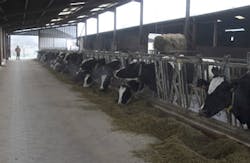The World Organization for Animal Health (OIE) has received notification of a mad cow disease case in Germany. Bovine spongiform encephalopathy (BSE), as the disease is officially named, was identified in a slaughtered cow that did not exhibit any clinical signs of the disease.
Tests conducted at the National Reference Laboratory (Friedrich-Loeffler Institute) confirmed the presence of a very rare form of BSE known as L-type. This is a disease form not generally linked to an animal's intake of infected feed, the OIE said.
RELATED: US adopts international standards for beef trade
The Paris-based organization stated further that the cow's carcass was destroyed and no meat had entered the food supply channels. Moreover, the identified offspring of the diseased cow have been slaughtered: out of seven in total, five had already been slaughtered before the notification and the other two have since been destroyed.
Reporting the news, Bloomberg said that it was the first BSE case in Germany since 2009. When people consume meat from infected animals, they can develop a human form known as variant Creutzfeldt-Jakob disease. This is a rare neurological condition with a fatal outcome. Among its symptoms are blurred vision, disorientation, hallucinations, lack of coordination and speech impairment, Bloomberg said. Death can occur within months and the incubation period remains unknown. According to the World Health Organization, there were 175 cases recorded in the United Kingdom between October 1996 and March 2011 and 50 or so in 11 other countries, among them the United States.
